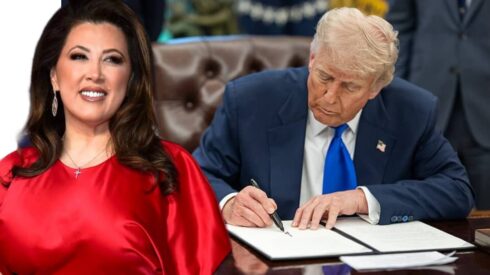President Donald Trump has abruptly withdrawn the nomination of Dr. Janette Nesheiwat for U.S. Surgeon General, just one day before her scheduled Senate confirmation hearing. The announcement came Wednesday via social media, as the president unveiled Dr. Casey Means, a rising figure in functional medicine, as his new nominee for the nation’s top public health post.
The decision to pull Nesheiwat’s nomination followed mounting scrutiny over how she had represented her academic and professional background in public profiles and media appearances. According to an investigation by independent journalist Anthony Clark, Nesheiwat’s LinkedIn profile inaccurately listed her as holding an M.D. from the University of Arkansas, when in fact she earned her medical degree from the American University of the Caribbean in St. Maarten. While the University of Arkansas confirmed she completed her residency there, officials clarified she did not receive a degree from the institution.
Senator Bernie Sanders, the ranking Democrat on the Senate Health, Education, Labor and Pensions Committee, confirmed Wednesday that Nesheiwat’s nomination was officially withdrawn. Her confirmation hearing had been scheduled for Thursday, and Sanders’ office noted the hearing would no longer proceed.
Criticism from Conservatives and Vaccine Policy Backlash
While questions about Nesheiwat’s credentials sparked bipartisan concern, opposition from within conservative circles also played a pivotal role in derailing her nomination. On Sunday, prominent conservative activist Laura Loomer posted on X (formerly Twitter) that she opposed Nesheiwat’s confirmation, citing her public support for COVID-19 vaccination campaigns during the pandemic. Loomer’s post quickly gained traction among Trump’s base, who expressed skepticism over vaccine policies.
The backlash highlighted ongoing divisions within the Republican Party regarding public health leadership and pandemic response measures. Some of Trump’s closest advisers reportedly warned that Nesheiwat’s stance on vaccines could alienate key factions of the president’s supporters ahead of the November election. By Wednesday morning, momentum to replace her had gathered steam, culminating in Trump’s announcement of a new nominee just hours later.
Despite the controversy, Nesheiwat issued a statement on X expressing her continued commitment to Trump’s agenda. “I am looking forward to continuing to support President Trump and working closely with Secretary Kennedy in a senior policy role to Make America Healthy Again!” she wrote. “My focus continues to be on improving the health and well-being of all Americans, and that mission hasn’t changed.”
Dr. Casey Means: A New Direction for Surgeon General
President Trump’s pick of Dr. Casey Means signals a pivot toward a more holistic and preventive approach to national health policy. Means, co-founder of the health technology company Levels and a former surgeon, has gained prominence for advocating lifestyle interventions to address chronic diseases. In announcing her nomination, Trump praised Means as “a transformative leader who will bring innovation and wellness back to the forefront of American healthcare.”
Means has built a following in both tech and wellness circles, emphasizing metabolic health, nutrition, and data-driven health tracking. Her critics, however, have raised questions about the scientific rigor of some wellness industry claims. Senate Democrats have indicated they plan to closely examine Means’ positions on key issues like vaccine mandates, reproductive rights, and opioid policy during her confirmation process.
If confirmed, Means would be tasked with leading the U.S. Public Health Service Commissioned Corps and advising the administration on public health challenges ranging from mental health to pandemic preparedness. Her nomination has already sparked debate about the balance between traditional medical practices and emerging wellness trends in federal health leadership.
Family Ties and Political Connections Under Scrutiny
Beyond the questions surrounding her credentials, Nesheiwat’s nomination had also drawn attention due to her familial and political connections. Her brother-in-law, Rep. Mike Waltz of Florida, a staunch Trump ally, was recently removed from his role as national security adviser and has since been nominated as U.S. ambassador to the United Nations. Some lawmakers had raised concerns about potential conflicts of interest stemming from the overlapping appointments within the same political orbit.
Observers noted that Nesheiwat’s frequent appearances as a Fox News medical contributor also positioned her within the president’s favored media ecosystem. While her role as a trusted television doctor enhanced her public profile, critics argued that her experience in clinical medicine and public health leadership was relatively limited compared to previous surgeon generals.
Despite the nomination’s collapse, insiders say Nesheiwat remains a valued figure within Trump’s political circle. Reports indicate she may be considered for a senior advisory role within the Department of Health and Human Services or on the president’s reelection health policy team.
A Setback and a New Chapter for Trump’s Health Agenda
The withdrawal of Nesheiwat’s nomination marks an early setback for President Trump’s effort to reshape his administration’s health leadership in a second term. Some Republicans privately expressed frustration that the White House vetting process failed to catch discrepancies in Nesheiwat’s resume before her nomination was announced last month.
At the same time, Trump’s swift pivot to Dr. Casey Means underscores the president’s desire to avoid prolonged controversy as the election season intensifies. Political analysts suggest that Means’ outsider status and focus on wellness could appeal to younger voters and suburban women, demographics Trump is eager to court in the fall.
For now, the Senate’s attention turns to Dr. Means’ forthcoming confirmation hearing, expected in the coming weeks. The hearing will provide the first glimpse into how lawmakers plan to navigate the ideological and scientific divides that have increasingly shaped America’s public health discourse.














